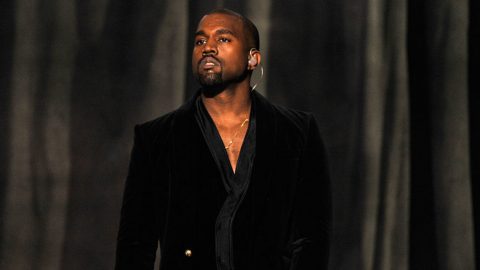
Priya Ragu has always believed that investing in herself first is the best move she can make. It’s a mantra that the Swiss-Tamil musician finally put into practice in May this year when she left her job as a technical purchasing agent for an airline in order to focus on her music. She simply wanted to re-write her narrative on the strength of her self-belief and her sharply evocative, vibrant and meticulously crafted songs.
Dialling in from a studio in west London where she is working on new music for the next few weeks, Ragu retells the story to NME. “I quit in the heat of the moment – it was so transformative,” she says, beaming. “I decided to put everything into my work, and when we went to shoot a video in India, I had no money left – but I knew I had to go, I had to do this. I just took the credit card and went wild. But all that mattered was that I was suddenly a full-time musician.”
Ragu’s debut mixtape, ‘damnshestamil’ (released this Friday), exists as a time capsule for the NME 100 alumni’s journey to international success and all the victories and challenges therein, from heartbreak (‘Forgot About’) to partying (‘Chicken Lemon Rice’). Co-produced by her brother JaphnaGold, the 11-track effort manages to alchemise a culture-melding joyride through a genre Ragu describes as “Raguwavy”, which fluidly blends influences from her Tamil heritage with uplifting R&B and soul embellishments without feeling pressure to be tethered to one mould.
“Despite the struggle, I have always been true to myself – that’s always been so important to me,” says Ragu. As she prepares to unveil ‘damnshestamil’ to the world, the genre-breaking star chats to NME about incorporating her heritage into her music, working with Jungle and what South Asian representation means to her.
You only quit your day job a few months ago. What did it take for you to realise that you wanted to commit to music full-time?
“All my life I have known that I have to do something with my music. But I just never really thought it’s possible, or I never really believed in myself until the past few years. It’s not that my family weren’t ever encouraging either, they were more just like, ‘Oh, it’s nice that you’re getting attention from the radio!’
“For a long time I really thought that I could juggle the two jobs, as music was always presented to me as something I could just do on the side. I had my doubts in the past as I thought that my music was too eclectic, but now I can see that the world is willing to accept and embrace what I’m doing – and it’s the most beautiful feeling.”
Without that support, how did you develop the confidence to pursue your vision?
“I’ve always known that in order to achieve my dreams, I need to push myself out of my comfort zone. When I was living in Switzerland, I was lucky to have somewhere to come home to; I knew that I could just go away for six months and then come back if it didn’t work out, or just find a new job. I had nothing to lose, you know?
“When I decided to commit to this, I was like, ‘Shit, so many other people would be afraid to take a chance on themselves’. I was privileged enough to grow up in Switzerland and receive a good education, so why not utilise that and believe in myself?”
How has growing up in Switzerland influenced you as an artist?
“I had a really cool childhood. But at home, everything was Tamil: the music, the food, the dancing. So once I started to move away from my family it felt like another world, and to balance the two cultures was not always easy, especially as a teenager.
“I used to have jam sessions at home with my brother and we would sing Tamil songs while he played the keyboard; you can hear those memories in my music now. That’s why incorporating Tamil culture into my work comes so effortlessly.”

In previous interviews you’ve described how you struggled to connect with your heritage when you were younger. What’s changed?
“I feel like the older you get, you want to find out more about who you are and where you have come from. I’ve asked myself so many times, ‘What is this culture about? Why am I resisting the opportunity to embrace it?’ It was never the plan to incorporate Tamil music into my career today. It just happened organically and slowly until I learned how to trust myself when it came to representing my culture.”
Why is representation so important to you now?
“It’s so important because I feel like there should be many more South Asian artists out there doing what I do. There aren’t enough of us, and it shouldn’t be something that we have to accept.
“When M.I.A. hit the mainstream, I really connected with her. Her music made me think, ‘Oh shit, this [career] is actually possible’. I now want to inspire other people like me to make music.”
What does your new mixtape, ‘damnshestamil’, mean to you?
“I know that my songs are powerful, and I feel while making this mixtape I finally gave myself the time to explore and try out other styles. I draw from so many influences: jazz, blues, Bossa nova… I was free to do whatever I wanted to do and not confine myself to a single genre.”
“I can see that the world is willing to accept and embrace what I’m doing – and it’s the most beautiful feeling”
When did you start making music with your brother?
“We started to work on music together in 2017. Before then, he was producing for local Swiss artists and I was doing my own thing, just trying to work it all out. At first I thought that I was going to find another producer to help me out because it would be a bit uncool to make music with my brother, then go on tour and be around him 24/7.
“But after we made a few songs together, I realised that we had this magic formula that couldn’t be replicated elsewhere. He’s taught me how to not always question my music, and to accept and expand my ideas. It’s a real journey where I am still discovering things about myself; I can be in the studio singing in Tamil, and then suddenly I’m rapping in English. He’s helped me learn how to embrace my versatility.”
How has this collaborative process changed your relationship with him?
“Before we did music together, we fought a lot. But now, we’re very protective of each other.
“It’s just a real win-win situation; we’re both so invested in our music and want to head out on this crazy journey together. I would have never dreamed something like this could happen – it’s unbelievable.”

You teamed up with Jungle for their recent track ‘Goodbye My Love’ – how did that come about?
“I have always been a huge fan of Jungle, so when we worked together I was like, ‘Oh shit, this music thing is serious!’. I was with Josh [Lloyd-Watson] in the studio, and we were working on a handful of tunes with no intention of putting them on a project.
“But at the end of the session, he was like, ‘OK, let’s try one more’ – and then, magically, ‘Goodbye My Love’ came along really easily to us. After we had finished he was like, ‘If you’re not taking this song, I’m going to put it on my album.’”
How are you feeling about your upcoming support slots with Jungle? Festivals aside, these will be your first live shows back, right?
“They’ll mark the first time I’ll play to thousands of people, so it’ll be an experience. I’m very nervous because it’s been a while since we played, and I haven’t ever been on tour properly either. All of this is new for me – and I’m just going to jump into the situation as if it’s cold, deep water!”
What would success look like to you with this mixtape?
“I don’t have a single goal; I’m here to just enjoy the journey itself, whatever happens. I often feel like I’m a small kid in a big chocolate factory with their eyes whirring around like, ‘Oh shit! Things are happening around me!’ I had a normal life before all of this, so there is absolutely nothing that can change me.”
Priya Ragu’s debut mixtape ‘damnshestamil’ is out on Friday (September 3).
The post Priya Ragu: inventive, exuberant R&B meets Tamil tradition appeared first on NME.









